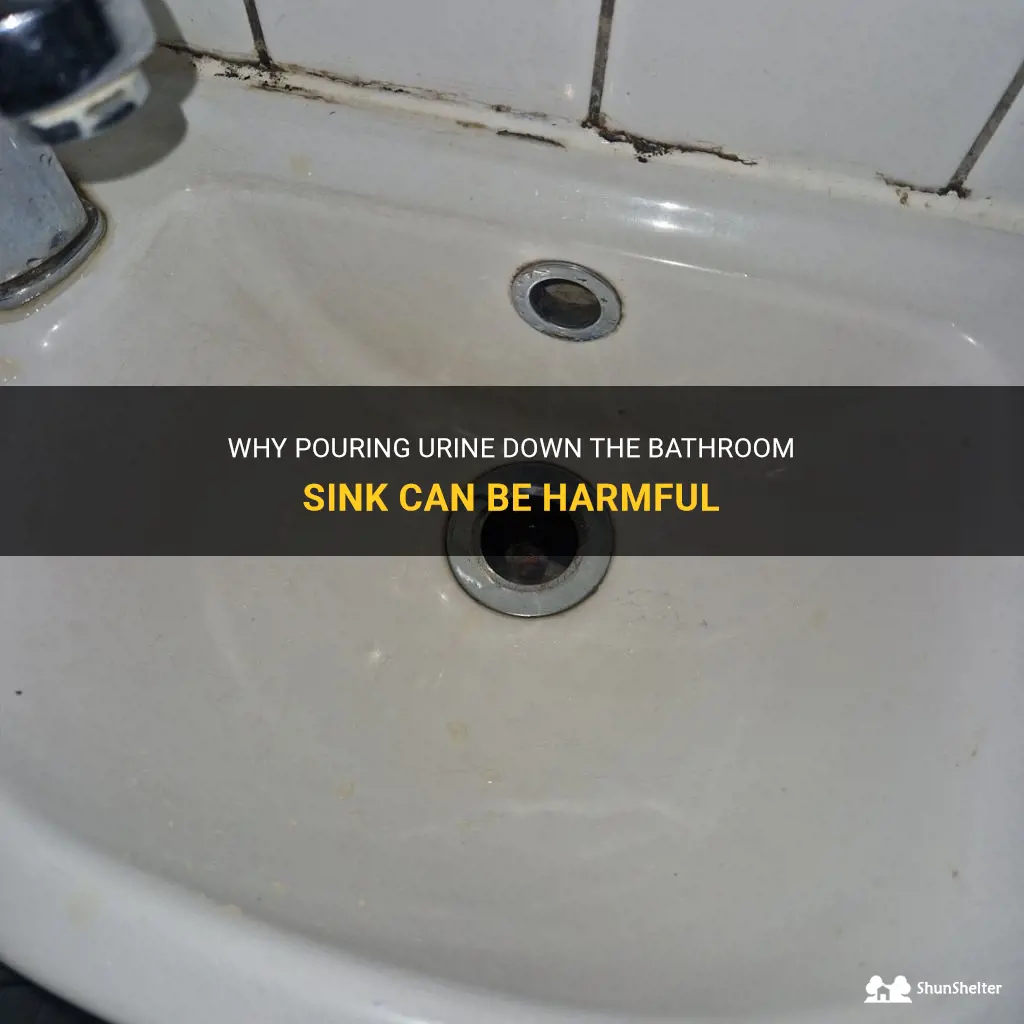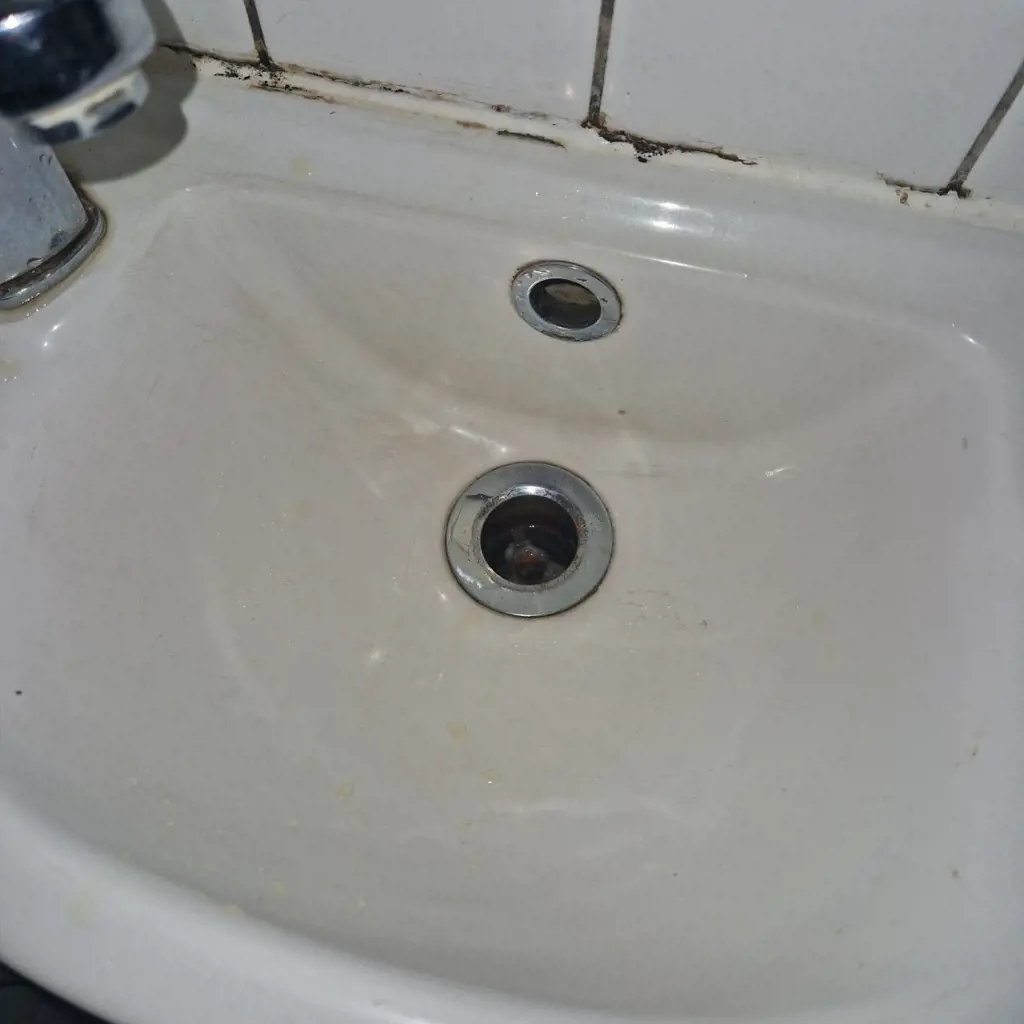
Have you ever found yourself standing in front of the bathroom sink, contemplating whether pouring a cup of piss down it is a bad idea? It may seem like a strange question, but believe it or not, there are reasons why this act is generally frowned upon. From hygiene concerns to potential damage to plumbing systems, pouring urine down the bathroom sink can have more consequences than one might expect. In this article, we will explore why this practice is considered a bad thing and delve into the reasons why it is best to find alternative methods of disposing of waste fluids. So, read on to discover the fascinating intricacies of bathroom etiquette and plumbing functionality when it comes to... well, urine.
| Characteristics | Values |
|---|---|
| Environmental Impact | Harmful to ecosystems, pollutes water sources |
| Hygiene Concerns | Unsanitary, can spread bacteria and diseases |
| Plumbing Damage | Corrosion of pipes and fixtures, clogs drains |
| Odor | Unpleasant smell, can linger in the bathroom |
| Waste of Water | Wasting a valuable resource |
| Social and Cultural Norms | Can be seen as disrespectful or offensive |
What You'll Learn
- What are the potential consequences of pouring urine down the bathroom sink?
- Does pouring urine down the bathroom sink cause any damage to the plumbing system?
- Are there any health risks associated with pouring urine down the bathroom sink?
- Is there a more appropriate method of disposing of urine in a residential or commercial setting?
- Are there any legal regulations or guidelines regarding the proper disposal of urine in a bathroom sink?

What are the potential consequences of pouring urine down the bathroom sink?

Pouring urine down the bathroom sink can have several potential consequences. While some might think it is harmless, urine contains a variety of chemicals and substances that can cause damage to the plumbing system and negatively impact the environment. In this article, we will explore the potential consequences of pouring urine down the bathroom sink, including the effects on plumbing, the environment, and personal health.
Firstly, urine contains high levels of uric acid, which can be corrosive to plumbing pipes and fixtures. Over time, the constant exposure to uric acid can lead to the degradation of pipes, resulting in leaks, clogs, and costly repairs. The acidic nature of urine can also contribute to the deterioration of rubber seals and gaskets, further exacerbating potential plumbing issues. It is important to note that even if no immediate problems are observed, the long-term damage from pouring urine down the sink can be significant.
Additionally, urine contains bacteria, viruses, and other microorganisms that can contaminate the plumbing system. These microorganisms can thrive and multiply within the pipes, leading to foul odors, blockages, and potential health hazards. As the bacteria and viruses are flushed down the drain, they can enter the sewer system and eventually find their way into rivers, lakes, and other bodies of water. This can have detrimental effects on aquatic ecosystems, potentially harming fish and other wildlife. The introduction of bacteria and viruses into the environment can also pose risks to human health if the contaminated water is used for drinking or irrigation purposes.
Pouring urine down the sink can also be a personal health concern. The close proximity of the bathroom sink to other areas where food is prepared or consumed, such as the kitchen, increases the risk of cross-contamination. Harmful bacteria and pathogens present in urine can spread to these areas, increasing the likelihood of foodborne illnesses. Furthermore, if the plumbing system becomes contaminated with urine, there is a risk of backflow, where contaminated water can flow back into the sink or other fixtures. This can result in the consumption or contact with urine-contaminated water, which poses a risk to personal hygiene.
To avoid the potential consequences of pouring urine down the bathroom sink, it is recommended to use the toilet for its intended purpose. Urine should be flushed down the toilet, as this is the appropriate method of disposal that ensures proper sanitation and prevents the introduction of urine into the plumbing system. If urine is collected for medical or other reasons, it should be disposed of according to local regulations, which may involve using a designated collection container or facility.
In conclusion, pouring urine down the bathroom sink can have several potential consequences, ranging from damage to the plumbing system to environmental pollution and personal health risks. It is important to use the toilet for its intended purpose and dispose of urine properly to prevent these negative outcomes. Adopting responsible practices when it comes to waste disposal can help maintain the integrity of plumbing systems, protect the environment, and safeguard personal health.
Exploring the Feasibility of Using Karndean in Bathrooms: A Comprehensive Guide
You may want to see also

Does pouring urine down the bathroom sink cause any damage to the plumbing system?
When it comes to waste disposal in the bathroom, many people wonder if it is okay to pour urine down the bathroom sink. Urine is a waste product that contains various chemicals and substances, so it's important to consider the potential impact on the plumbing system.
From a scientific perspective, urine is primarily made up of water (about 95%) and various dissolved substances such as urea, salts, and toxins. While these substances may not pose an immediate risk to the plumbing system, they can still have long-term effects if consistently poured down the sink.
One of the main concerns with pouring urine down the bathroom sink is the potential for clogs. Over time, the chemicals and substances in urine can accumulate and solidify, forming blockages in the pipes. These blockages can restrict or completely block the flow of water, leading to plumbing issues such as slow drainage or backups.
Additionally, the presence of urea in urine can contribute to the growth of bacteria and fungi. When urine mixes with other substances present in the plumbing system, such as soap residue or food particles, it creates an ideal environment for microorganisms to thrive. This can lead to unpleasant odors, as well as the potential for mold or mildew growth inside the pipes.
From an experiential standpoint, pouring urine down the bathroom sink may seem convenient, especially if the toilet and sink are in close proximity. However, it's important to note that bathroom sinks are not designed to handle waste products like urine. They are primarily meant for handwashing and the disposal of small amounts of water.
So, what is the proper way to dispose of urine? The best and most hygienic option is to use the toilet. Urine is considered sewage waste and should be properly flushed to a treatment facility. This ensures that the waste is properly processed and prevents any potential harm to the plumbing system.
To summarize, pouring urine down the bathroom sink may not cause immediate damage to the plumbing system, but it can lead to clogs and bacterial growth over time. It is best to use the toilet for waste disposal to prevent these issues and ensure proper hygiene. Taking care of your plumbing system by disposing of waste correctly will help maintain its functionality and prevent any costly repairs down the line.
Common Sexual Diseases That Can Be Contracted from Sharing a Bathroom
You may want to see also

Are there any health risks associated with pouring urine down the bathroom sink?
Urine is a waste product that is produced by our bodies, and it contains various substances that can potentially be harmful to our health. While it is generally safe to pour urine down the bathroom sink, it is important to consider some health risks and take precautions to mitigate them.
One of the main health risks associated with pouring urine down the sink is the potential for bacterial contamination. Urine can contain bacteria such as Escherichia coli (E. coli), which can cause urinary tract infections and other health issues. When urine is poured down the sink, it can come into contact with the sink's surfaces and potentially contaminate them. This is especially true if the sink is not properly cleaned and disinfected afterward.
To minimize the risk of bacterial contamination, it is important to thoroughly clean and disinfect the sink after pouring urine down it. Using a disinfectant cleaner or a mixture of bleach and water can effectively kill any bacteria present on the sink's surfaces. Additionally, regularly cleaning and disinfecting the sink as part of your regular cleaning routine can help prevent the buildup of bacteria.
Another health risk associated with pouring urine down the sink is the potential for chemical reactions. Urine contains various chemicals, including urea, ammonia, and uric acid. When these substances come into contact with other chemicals present in the sink, such as cleaning products or residue from personal care products, chemical reactions can occur. These reactions can release harmful gases, such as chlorine gas, which can be irritating to the respiratory system and cause respiratory problems.
To minimize the risk of chemical reactions, it is important to avoid pouring urine down the sink immediately after using cleaning products or personal care products that contain chemicals. It is also recommended to flush the sink with water before and after pouring urine down it to dilute any potential chemical residues.
Some people may choose to pour urine down the sink as a way to conserve water or as a means of disposing of waste in a more environmentally-friendly manner. While these intentions are commendable, it is important to understand the potential health risks and take appropriate precautions.
Alternative methods for disposing of urine in a safe and environmentally-friendly manner include using a designated toilet or urinal for urine collection, which can then be properly flushed and treated in a wastewater treatment facility. Another option is to use a urine-separating toilet or a composting toilet, which can process urine separately from solid waste and turn it into a valuable fertilizer.
In conclusion, while it is generally safe to pour urine down the bathroom sink, there are some potential health risks to consider. Bacterial contamination and chemical reactions are the main concerns, but these risks can be mitigated by properly cleaning and disinfecting the sink, avoiding mixing urine with cleaning products or other chemicals, and considering alternative methods of urine disposal. It is always recommended to prioritize personal hygiene and take necessary precautions to ensure the safety and well-being of oneself and others.
Exploring Bathroom Inclusivity: The Policy on Bathroom Use at Target Stores
You may want to see also

Is there a more appropriate method of disposing of urine in a residential or commercial setting?

Urine disposal is a common concern in both residential and commercial settings, as it can be unsightly and unpleasant to deal with. While many methods exist for disposing of urine, some are more appropriate than others, depending on the specific situation.
In a residential setting, the most common method of disposing of urine is through the use of a toilet. This is generally considered the most appropriate method, as toilets are designed to safely and effectively dispose of waste. However, in situations where a toilet is not available or practical, there are alternative methods that can be used.
One option is to use a portable urinal or a bedpan. These portable devices are designed to collect urine and can be emptied into a toilet or disposed of in a sanitary manner. They are often used by individuals with limited mobility or who are bedridden, as they provide a convenient and hygienic way to dispose of urine.
Another option is to use absorbent products, such as adult diapers or absorbent pads. These products are designed to soak up urine and prevent leakage. Once soiled, they can be disposed of in the same manner as regular household waste. This method is commonly used in situations where individuals have difficulty reaching a toilet or when a toilet is not readily available.
In a commercial setting, such as a public restroom or office building, the most appropriate method of urine disposal is through the use of urinals or toilets. These fixtures are specifically designed to handle and dispose of urine in a sanitary manner. Public restrooms often have flushing mechanisms that help to eliminate odors and maintain cleanliness.
In some cases, a commercial setting may also use specialized equipment, such as automatic flush systems or urine collection devices. These devices help to ensure that urine is promptly and safely disposed of, reducing the risk of odors and maintaining hygiene standards.
It is important to note that proper disposal of urine is not only important from a hygiene perspective but also from an environmental standpoint. It is essential to dispose of urine in a manner that does not contaminate water sources or contribute to pollution. In residential settings, urine can be safely disposed of by flushing it down the toilet, as the water treatment process is designed to remove and treat waste. In commercial settings, it is important to follow local regulations and guidelines for urine disposal to ensure proper waste management.
In conclusion, the most appropriate method of disposing of urine in a residential or commercial setting is through the use of toilets or urinals. These fixtures are specifically designed to handle and dispose of urine in a sanitary manner. However, alternative methods, such as portable urinals or absorbent products, can be used in situations where a toilet is not available or practical. Regardless of the method used, it is important to dispose of urine in a manner that is hygienic and does not contribute to environmental pollution.
Is It Possible to Smell Another Person Through a Bathroom Cubicle?
You may want to see also

Are there any legal regulations or guidelines regarding the proper disposal of urine in a bathroom sink?

Urine is a waste product produced by the human body and, as such, its proper disposal is crucial for maintaining public health and sanitation. While there may not be specific legal regulations regarding the disposal of urine in a bathroom sink, there are general guidelines and best practices that can help ensure proper waste management.
Firstly, it is important to note that urine is not classified as hazardous waste, as it does not generally pose a significant risk to public health. However, it does contain bacteria and other microorganisms that can cause unpleasant odors and potentially spread disease if not handled properly.
When disposing of urine in a bathroom sink, it is recommended to dilute it with water before letting it go down the drain. This helps to minimize odors and prevents any potential buildup of bacteria in the plumbing system. Simply flushing the sink with water for a few seconds after urinating can be sufficient to achieve this dilution.
It is worth noting that diluting urine with excessive amounts of water is not recommended either, as it can put unnecessary strain on the plumbing system and potentially lead to clogs. A balance should be struck between dilution and water conservation.
In situations where it is not feasible to dilute urine in a sink, such as when using public restrooms or portable toilets, it is recommended to use designated facilities for urine disposal, such as urinals or specialized containers. These facilities are designed to handle urine in a more efficient and sanitary manner.
Additionally, it is important to adhere to any local regulations or guidelines regarding waste management in public spaces. Some jurisdictions may have specific requirements for the disposal of urine, and it is important to be aware of and comply with these regulations to maintain public health and prevent any potential fines or penalties.
In conclusion, while there may not be specific legal regulations regarding the disposal of urine in a bathroom sink, it is important to follow general guidelines and best practices for waste management. Diluting urine with water before letting it go down the drain can help minimize odors and prevent the buildup of bacteria. Additionally, using designated facilities for urine disposal in situations where sink dilution is not feasible is recommended. Adhering to local regulations and guidelines is crucial for maintaining public health and sanitation.
Removing an Under Sink Bathroom Access Panel: A Step-by-Step Guide
You may want to see also
Frequently asked questions
Yes, pouring urine down the bathroom sink can be bad for the plumbing. Urine contains acids and other chemicals that can corrode pipes and cause blockages over time. It is better to dispose of urine in the toilet, which is designed to handle waste.
Yes, pouring urine down the bathroom sink can cause unpleasant odors. Urine contains ammonia, which can produce a strong and distinctive smell. This odor can linger in the bathroom and be difficult to eliminate. Using the proper facilities, such as the toilet, can prevent these odors from occurring.
Pouring urine down the bathroom sink can potentially pose a health risk. Urine can contain bacteria and other pathogens that can be harmful if exposed to the skin or ingested. It is important to follow proper hygiene practices and dispose of urine in the appropriate manner to minimize the risk of contamination.
Yes, pouring urine down the bathroom sink can potentially stain or damage the sink. Urine can leave behind residue and discoloration, particularly on surfaces that are not easily cleaned or are made of porous materials. Regularly cleaning and disinfecting the sink can help prevent staining and damage.
The legal implications of pouring urine down the bathroom sink may vary depending on local regulations. In some areas, it may be considered a form of improper waste disposal, which could be subject to fines or penalties. It is advisable to check with local authorities or consult a plumber to understand the specific regulations and guidelines in your area.







